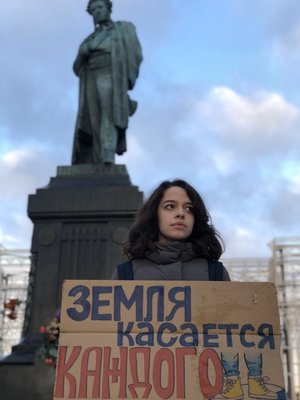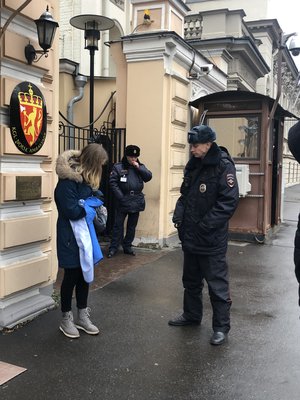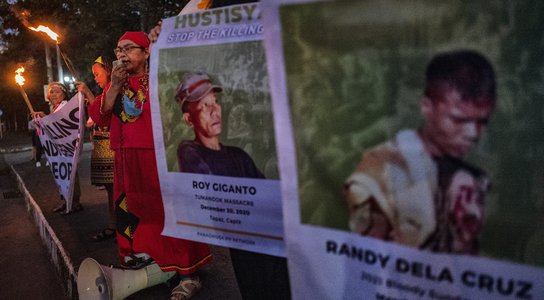The Fridays for Future global climate strike movement has inspired young people across the globe to take to the streets and urge politicians to stop climate breakdown. At the same time, however, governments around the world have been closing down the space for peaceful protest. According to CIVICUS, only 3% of the world is reportedly living in countries with open civic space - where the ability to organise and participate in political and social activism is freely permitted.
In Russia, young climate activists face heavy restrictions on the right to protest, as well as the threat of criminalisation and targeting by police. This hasn’t stopped them though, and a small network of Fridays for Future activists are determined to make sure the Russian government listens to their demands for a greener future.
So, what does a youth climate protest look like in such a restrictive climate?
Usually, a young person on their own, holding a solo protest.
Rita Naumenko, Fridays for Future activist, holds a placard saying ‘The Earth is everybody's responsibility in Moscow, Russia, February 2020
‘A lot of people are afraid of going to the strikes in Russia, because our government is kind of oppressive and not everyone has an opportunity to protest,’ said Rita Naumenko, 16, a Fridays for Future activist in Moscow, and part of an educational project about climate change in Russia.
That’s because in Russia, solo protests are allowed, while there are strict laws on mass protests – in other words, a protest with two or more people would be considered illegal without prior permission from authorities. Anyone that wishes to protest in public spaces – whether it is a march, or an organised sit-in, must apply for permission. People under 18 are prohibited from organising protest gatherings; for young people, the situation is very unclear because if they can only stage a solo protest they are technically both organiser and participant.
‘There’s so much pressure from the authorities,’ says Maya*, a Fridays for Future coordinator, ‘I don’t understand why you can go and sit on the beach but can’t stand all by yourself with a banner. I tried organising larger scale protests but getting approved [by the local authorities] is rather problematic.’
‘In most cases authorities will allow [mass protests], but they’ll offer another location. So if we ask to have the protest in downtown Moscow where a lot of people can see the protest, they will change the location so you cannot engage with people… Usually in Moscow they will propose that we protest in Sokolniki Hyde Park, which is like a forest with really few people! We normally turn it down to show we don’t agree with their decision, so we resort to single protests in the city’.
Then there’s the threat of police harassment and criminalisation. Last year, the 25-year-old violinist and climate activist Arshak Makichyan staged a solo climate strike in Moscow’s Pushkin Square for over 40 weeks. He was later arrested and jailed for six days for carrying out an unauthorised peaceful protest. The law disallowing young people from organising protests has been used to detain those under 18 in Russia when they decide to stage solitary protests.
‘Talking to people who are genuinely interested in having a conversation is rare,’ says Maya, ‘I’m often criticised. Sometimes that takes a form of aggression.’
‘I feel really unsafe because I protest in the centre of the city’ said Rita. ‘I feel unsafe not only because of the police who will come and check passports… I know if they check mine they will detain me. But also when I feel this attention from people who are so sceptical (of climate change) and they will come to you and insult you. It makes me feel sad.’ Rita says she also experiences harassment online when she posts about her activism on Twitter.

A young climate activist is confronted by authorities in Moscow, Russia
Russia is the fourth
largest emitter of greenhouse gases in the world — after China, the U.S. and
India — contributing around 4.6% of all global emissions. At the same time,
Russia is particularly vulnerable to the devastating impacts of the climate
crisis with its vast arctic regions. The country has recently experienced wildfires
and floods and is warming 2.5 times faster than the planet as a whole.
However, Maya and Rita both described the lack of reliable and fact-based information about climate change in Russia. They have both had to seek out the information, and see their activism work as a valuable way to raise awareness of the dangers of climate breakdown. Just 7% of Russians see climate change as a major problem for the country, according to polling data published by the Moscow-based Levada Centre last December.
‘The media coverage of climate change is poor in comparison to European countries,’ said Rita, ‘I read climate change news in English, but a lot of people in Russia cannot read it – it’s my privilege of course to have access to this information. Just last year I didn’t know anything about climate change, no one will tell you about it at school and no one will talk to you about it at home.’
What are their demands?
The climate strikers want the Russian government to make climate justice a priority. Fossil fuels is a real concern, Maya says Russia needs to stop its continuous investment in fossil fuels and switch to renewable energy instead. Despite the challenges, climate activists are starting to see some progress. Earlier this year, Rita and some other climate activists attended a meeting with the government’s climate advisor to deliver their demands.
‘The best thing about activism is that you are educating other people about climate change,’ said Rita, ‘It can catch the attention of people, if they see someone standing with a poster that says ‘system change, not climate change’ for instance and then they are at least asking themselves ‘what does it mean? What’s the problem’? it can also attract the attention of government, if we didn’t do activism then we wouldn’t have an opportunity to express our opinion or give our proposals to the climate advisor’
‘Our conversations, pickets, protests and voluntary work do change people over time. It is very hard to influence the government in Russia. But influencing people [their collective consciousness] is easy. People have no idea what climate emergency is. However, they want to support [what we do] when they learnt about these things from me.’
*name has been changed
Author
-
Jasmin Qureshi
Multi-Media Editor


